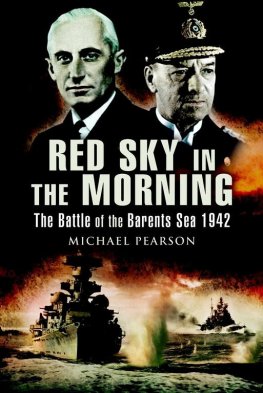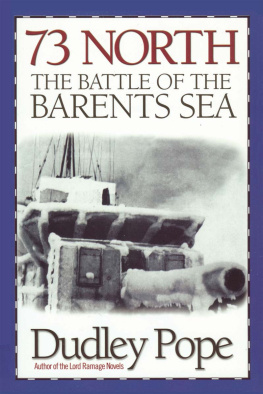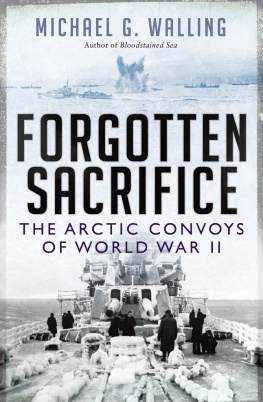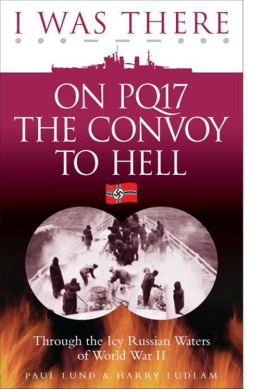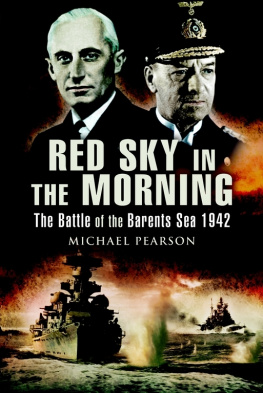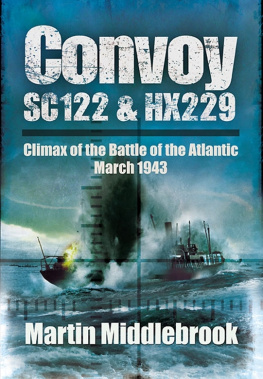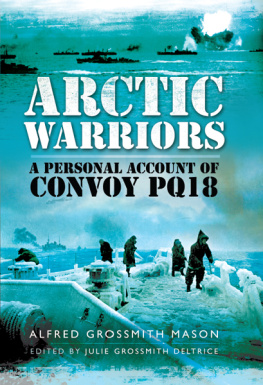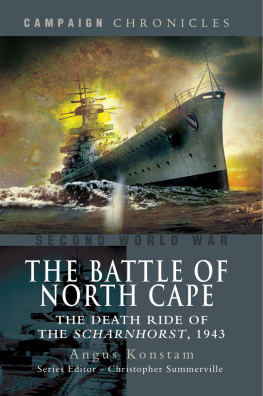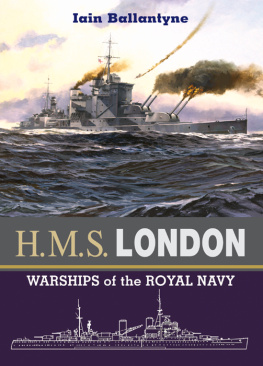Michael Pearson
RED SKY IN THE MORNING
The Battle of the Barents Sea 1942
Watching from this locality the battle has reached its climax. I can see only red.
Kapitnleutnant Karl-Heinz Herschelb,
U354, 11.45 hrs, 31 December 1942
For my parents Marie and Leslie,
who lived through those years
I would like to extend my sincere thanks to the following persons and organisations without whom this book would not have been possible. I would particularly like to thank the veterans, British and German, who contributed their recollections and expertise with such unfailing enthusiasm and good humour.
Mr Smith Belford
Bundesarchiv, Koblenz (Researcher Dr Ekkehart Guth)
Lieutenant-Commander J.P. Donovan
Radio Mate and Guard Commander Johann Hengel
Captain Michael Hutton
Imperial War Museum, London
Mrs Pamela Marchant, for permission to use the taped interview with Lieutenant-Commander T.J. Marchant
Commander Loftus Peyton-Jones
Public Records Office, London
Mrs Helen Rhead, for permission to use the memoir of Lieutenant-Commander Eric Rhead
Control Telephone Officer for Heavy Artillery Josef Schmitz
Lieutenant-Commander A.W. Twiddy
Leading Stoker Walter Watkin
I would also like to express my appreciation to Mike Taylor, my good friend and fellow history buff, for his invaluable help in checking the drafts and proofs.
Mike Pearson
On 31 December 1942, the icy expanse of the Barents Sea witnessed a naval battle which all but ended offensive operations by the heavy ships of the German navy for the remainder of the war. How this came to be is firmly rooted in the psyche of Adolf Hitler. Military hardware of all kinds held a fascination for Germanys Fhrer, and it was inevitable that he would be drawn to the tremendous power of the heavy ships of his navy, both as weapons of war, and for the prestige and influence which they attracted to the Reich from abroad.
His attitude to the navy in general, however, was complex, and can be traced back to Germanys defeat in 1918. A significant factor in that defeat, Hitler believed, had been the mutiny of the High Seas Fleet, and as such he never totally trusted the navy. It is probably also fair to say that he was not navy-minded, having little understanding of the complexities of naval warfare; and was, compared with land operations, unsure of himself when dealing with the war at sea. In a moment of unusual self-criticism, he remarked that he considered himself a lion on land but a coward at sea.
The naval war began badly for the German surface fleet, with the loss of the pocket battleship Admiral Graf Spee in December 1939, and, although there can be no doubt that the officers and men of the heavy ships fought with as much skill and determination as any other branch of the German armed forces, Hitlers apprehension over the fate of his major warships grew, fuelled in May 1941 by the destruction of the unsinkable Bismarck.
In December 1942, the defeat in the Barents Sea of Vice-Admiral Kummetzs powerful battle group, at the hands of a small force of destroyers and two light cruisers, was the last straw. That this defeat was due, in part, to restrictions placed on the commander at sea by a naval high command well aware of his unease over the possibility of loss or damage to the heavy ships was ignored, and Hitlers mood turned to fury. For him, all ships of the German navy above the size of destroyers were now a useless waste of men and matriel, and were to be scrapped. Ultimately this large scale scrapping did not take place, however most of the ships in question were decommissioned, and following the Battle of the Barents Sea, only one offensive operation was undertaken by a German heavy ship the abortive sortie by Scharnhorst, also in the Barents Sea, one year later.
CHAPTER 1
RUSSIAN ROULETTE
On 30 January 1933 Adolf Hitler became Chancellor of Germany, and within days called a meeting of senior Nazi officials and officers of the armed forces. He declared to his bemused but enthused audience that the conquest of the land in the east [principally Soviet Russia] and its ruthless Germanization, was his unshakable and unalterable goal. If ever a man carried with him the seeds of his own destruction it was Germanys new Fhrer.
In succeeding years, Hitlers expansionism in Europe brought him into conflict with the interests of Britain and France, and realising that he could not fight a war on his eastern and western fronts at the same time, by 1939 he had concluded a non-aggression pact with Soviet Premier Stalin, intended to keep Russia quiet while he finalised military operations in the west. The Fhrer remarked that the pact was an entente, in short, watched over by an eagle eye and with a finger on the trigger, amply illustrating his attitude both to the pact and to Russia. For his part Stalin, mistrustful of anybody and everybody, including Hitler, was quite prepared to play along to buy time and see what developed.
It did not take long for the Fhrers next move to be made, and several uncomfortable provisions of the German Russian pact to unfold. The German invasion of Poland began on 1 September 1939, quickly followed by declarations of war by Britain, France, Australia, and New Zealand. By 17 September the rapid advance of the Wehrmacht came to a halt, having overrun approximately half of Polands territory. Then, as the world watched mesmerised, the Red Army rolled westward from its borders to occupy the other half. Not for the first time in its stormy history, Poland had ceased to exist as a nation. It was evident that some carving up of territory had been agreed between the USSR and Germany, and more was to come. Included in the Soviet sphere of influence were the Baltic republics of Lithuania, Latvia and Estonia, and also intended as a Soviet satellite was Finland.
The Finns, however, had other ideas. Resisting intense Soviet political pressure for two months, they finally felt obliged to mobilise their vastly outnumbered 200,000-strong army, whereupon Stalin broke off negotiations and on 31 November 1939, invaded. Despite having no armoured units and no heavy artillery, the Finnish forces not only held the mighty Red Army but in some areas threw it back in confusion; while in Berlin, Hitler noted with satisfaction the difficulties Russia had overcoming a substantially weaker enemy. The problems must have been equally apparent in the Kremlin, but, Stalin nevertheless ordered the assault pressed home until finally the Finns, after inflicting heavy losses on the Russians, were forced to ask for an armistice. This was refused, but considering their dominant position, the terms offered by the Russians, and accepted by the Finns on 13 March, were not as severe as they might have been. They also offer a fascinating insight into the Russian High Commands thinking, and have considerable bearing on later operations in the Barents Sea.
The Russians were to lease the Hanko Peninsula from Finland (for thirty years), giving them control over the entrance to the Gulf of Finland; they would also occupy Viipuri and the Karelian Isthmus, enabling them to defend Leningrad in depth. To the north Russia would control the mountains west of Kandalaksha, a strong defensive position covering the railway line from Murmansk on the Barents Sea coast to Leningrad and the Russian interior. It is apparent from these dispositions that the Soviet regime fully expected a war on its western frontier, and was also fully aware that Murmansk, and Archangel further east along the coast, were the only ports in western Russia capable of receiving supplies in any quantity.

